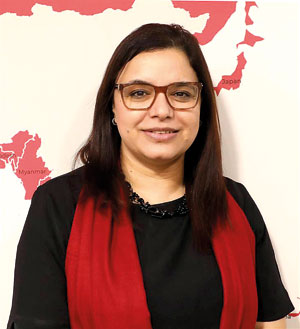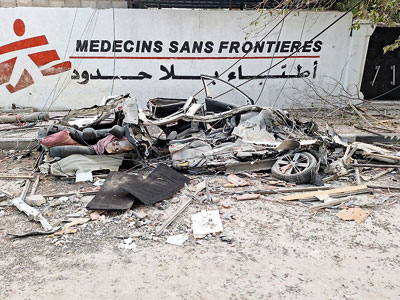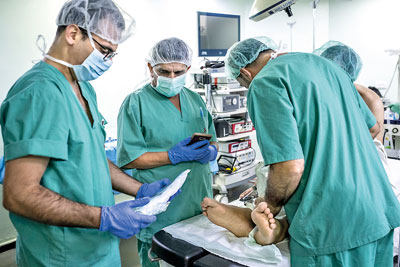Sunday Times 2
MSF: Children paying heaviest price in Gaza with their lives, bodies and futures
View(s):By Ameen Izzadeen
As Gaza plunges deeper into one of the world’s worst humanitarian crises, Farhat Mantoo, Executive Director of Médecins Sans Frontières South Asia, says children are paying the heaviest price—with their lives, their bodies, and their futures. In an exclusive interview with the Sunday Times, MSF’s South Asia chief outlines the worsening situation in Gaza and the hardships MSF volunteers face in delivering humanitarian aid in the war-ravaged and besieged Palestinian territory. She also discusses why MSF has chosen Sri Lanka as the location for its new regional head office. Excerpts:
MSF’s decision to distance itself from the so-called Gaza Humanitarian Foundation and its condemnation of this US-Israel-backed group are commendable. Given this stance, has your organisation conducted an independent assessment of
the severity of the humanitarian crisis in Gaza?

MSF’s South Asia chief Farhat Mantoo
Médecins Sans Frontières (MSF)/Doctors Without Borders has witnessed firsthand the catastrophic collapse of the humanitarian system in Gaza. Our medical teams continue to operate in extremely challenging conditions, conducting direct assessments based on patient data, field reporting, and coordination with other humanitarian actors. What we are witnessing is not just a crisis; it is a manufactured disaster.
Aid is being weaponised. It is being denied, delayed, and manipulated as a tool of control. Since the launch of the Gaza Humanitarian Foundation, our teams have reported people shot while queuing for food and essentials. Hundreds have been wounded and many killed. This is not the protection of humanitarian space; this is its violation. The global humanitarian system, including MSF, has been built over decades, grounded in international law, medical ethics, and humanitarian principles. It has evolved through experience in the world’s most complex emergencies. The knowledge, logistics, and systems developed by independent humanitarian actors cannot be replicated or replaced overnight by a politically driven structure. The Gaza Humanitarian Foundation is an attempt to sidestep independent humanitarian organisations and to funnel aid through a militarised and politicised apparatus. This undermines the very foundation of impartial humanitarian action.
MSF South Asia stands firmly with the global MSF movement in rejecting any mechanism that instrumentalises aid and violates the principles of neutrality, independence, and impartiality. Humanitarian assistance must be needs-based, not conditioned by political agendas. We continue to witness the consequences on the ground with a rise in malnutrition cases among children, the collapse of medical supply chains, and hospitals turned to rubble or emptied by forced evacuations. This is not collateral damage. It is the outcome of deliberate restrictions on the essentials for life: food, water, medicine, and safety.
We urgently call for the restoration of full, unfettered humanitarian access to Gaza. Civilians must be protected. Humanitarian actors must be allowed to work independently. And a sustained ceasefire must be enacted immediately, not as a political concession, but as a humanitarian necessity. The world must not look away while decades of principled humanitarian work are dismantled in real time and while children suffer and die as a result.
Reports indicate that scores of children have died of hunger in Gaza. Do you hold the United States and certain Western governments responsible for the worsening humanitarian crisis, given that their support for Israel is widely believed to have emboldened it to impose a blockade and obstruct UN agencies like UNRWA from carrying out food distribution?
We are bearing witness to a humanitarian crisis in Gaza where children are paying the heaviest price with their lives, their bodies, and their futures. Our teams are treating children with burns from airstrikes and cooking accidents, watching them struggle to heal without enough food, clean water, or medicine. We are seeing children too weak to recover because they have gone days without a proper meal. Many of our own staff who are parents themselves survive on one meal a day while continuing to care for others.
This suffering is not abstract. It is real, preventable, and the result of choices being made. Since May 19, only a few hundred trucks of aid have entered Gaza. Most have carried food but nowhere near enough for a population devastated by months of siege and bombardment. We are not only seeing the impact of bombs on children’s bodies, but we are also witnessing the long, slow violence of hunger. This is not a logistical failure. This is not a natural disaster. This is the deliberate blocking of aid and the destruction of the conditions needed for life.

Under attack: MSF volunteers
MSF is deeply concerned by the role of all governments with influence over this conflict, including the United States and EU member states. Continued political and military support without accountability has helped sustain this catastrophe. International donors cannot claim to uphold humanitarian principles while supporting policies that starve children and bomb hospitals. We call urgently and unequivocally on all governments to use their leverage to restore full, unhindered humanitarian access into Gaza. We will continue to speak out, not only as doctors and humanitarian workers but also as witnesses. Because what is happening to children in Gaza must never be accepted as normal.
We urge all governments, including those in the West, to use their leverage to restore full, unimpeded humanitarian access. Silence or passive endorsement in this context translates into complicity.
Israel’s indiscriminate bombings over the past 18 months or so have killed more than 55,000 Palestinians, two-thirds of the victims being children and women. Would you classify Israel’s actions as genocide?
In our December 2024 report, Gaza: Life in a Death Trap, we documented the systematic destruction of civilian infrastructure, repeated forced displacement, and the targeting of hospitals and medical personnel. Our teams have treated severely wounded patients, only to receive them again days later with new injuries sustained in renewed attacks. Entire communities have been displaced multiple times. Access to essential items such as food, water, shelter, and healthcare has been deliberately obstructed. Since the release of the report last December, the situation on the ground has only worsened, and what our teams are seeing is consistent with patterns of genocide.

Attending to a wounder civilian in the Gaza Strip
In June 2025, MSF publicly called on EU leaders to act in response to what we described as a “clear pattern of ethnic cleansing”. We emphasised the deliberate dismantling of Gaza’s health system, the repeated bombing of areas designated safe, and the use of siege tactics that deprive civilians of the means to survive. These are not incidental consequences of conflict; they represent a systematic assault on the conditions necessary for life.
We are bearing witness to what we know: this is not simply the by-product of war; it is a sustained and organised dismantling of civilian life.
Can you explain MSF’s role in Gaza and the challenges your organisation faces in providing health care to sick and wounded Palestinians?
MSF has been providing medical care in Gaza for over twenty years. Our work includes surgical services, trauma and burn care, and mental health support delivered through MSF-run clinics as well as in partnership with local health facilities. Even before the current escalation, getting medical supplies into Gaza was a challenge. Israeli authorities operate a screening process for items considered to have potential dual use, many of which are essential for healthcare. Equipment such as sterilisation tools, diagnostic devices, and certain medications often face restrictions or delays. Still, we were previously able to bring in key items like pain relief medication, antiseptics, and drugs for chronic illnesses such as diabetes.
Since the siege intensified in March, MSF’s operations have become extraordinarily difficult. Only four MSF trucks carrying basic medical items, mainly painkillers, antibiotics, saline, gauze, and gloves, have been allowed into Gaza. Requests for essential supplies such as wheelchairs, nebulisers, blood glucose monitors, and water treatment chemicals were denied entry, despite initial approval. This is not sufficient. Prior to the war, an average of 500 trucks entered Gaza daily with humanitarian and commercial goods. Today, what is allowed in falls drastically short of what is needed to meet even the most basic medical and survival needs of the population.
Our teams are doing all they can with the limited resources available, often while under direct threat. This is not just a humanitarian crisis; it is a medical emergency worsened by systematic restrictions and repeated attacks on healthcare. Since October 2023, MSF staff and patients have been forced to evacuate at least 18 health facilities. We have documented over 50 violent incidents involving airstrikes on hospitals, tank fire on clearly deconflicted shelters, ground incursions into medical centres, and convoys being shot at. Eleven of our colleagues have been killed. These are not accidents. They represent a consistent pattern of disregard for the protection of medical personnel and facilities, in clear violation of international humanitarian law.
Ensuring the safety of our staff has become one of our greatest challenges. Despite this, MSF remains committed to providing medical care wherever possible and bearing witness to the suffering of patients who are being denied access to even the most basic treatment. We continue to call for urgent facilitation of humanitarian access and for the protection of healthcare workers and facilities. Medical care must never be obstructed or targeted.
Is MSF urging Western governments, some of whom are its donors, to pressure Israel so that urgently needed medical supplies can
reach hospitals?
We do not accept funding from governments, Western or otherwise, for our work in Gaza or elsewhere. This policy safeguards our independence and ensures that our actions are guided solely by medical needs, not political agendas. Our operations rely entirely on private, individual donations, which allow us to remain impartial, neutral, and focused on our humanitarian mission. That said, independence does not mean inaction in the face of injustice. We continue to urge all governments and international actors, publicly and privately, to use their political influence to ensure immediate and unhindered humanitarian access to Gaza. The words need to match actions. Governments cannot speak of protecting civilians and humanitarian values while endorsing or enabling policies that obstruct aid and endanger medical workers.
MSF’s teams in Gaza are facing a critical shortage of supplies. Medical stocks, fuel, water, and food are running dangerously low. Our staff are forced to make difficult choices every day, distributing limited resources across multiple facilities, knowing the needs far outweigh what is available. If current restrictions on humanitarian access persist, we will not be able to continue providing medical care. This will directly impact patients whose lives depend on timely and adequate treatment.
We are clear in our call: the immediate and unimpeded flow of humanitarian aid, including medical supplies, fuel, food, and water, must be allowed. These are not luxuries; they are essential for survival. Blocking their entry into Gaza violates international humanitarian law and places civilian lives at grave risk. We also stress that aid must not be conditioned, politicised, or militarised. Humanitarian assistance must be facilitated and not controlled or delayed by those with influence. All states, particularly those with strong ties to Israel, have a responsibility to uphold the principles of humanity, impartiality, neutrality, and independence in conflict settings. This is not only a legal obligation but also a moral imperative.
How safe are the MSF doctors and medical workers in Gaza?
In Gaza, our MSF colleagues are working in one of the most dangerous and morally devastating environments imaginable. Amid relentless bombardments, ground offensives, and the collapse of any semblance of civilian protection, they continue to provide care while their own families are displaced, grieving, and in danger.
The hospitals we support have been shelled. Medical teams have been forced to evacuate under fire. The remaining health facilities are overwhelmed, functioning under siege conditions. Doctors are forced to make impossible choices about who can be saved with the few resources left. These are not medical dilemmas; they are moral injuries inflicted by a war that disregards humanitarian principles. And yet, our teams endure. They keep treating the wounded, delivering babies under bombardment, and performing surgeries in overcrowded hallways. No one should have to make these choices. No one should carry the burden of wondering whether they will survive the day while trying to save others. Moral distress is real and growing. Our colleagues are not just exhausted; they are despaired by the preventable suffering they are witnessing.
Healthcare workers are not a target. Hospitals are not battlefields. In Gaza, these basic truths have been obliterated. The deliberate obstruction and targeting of healthcare is not just a violation of international humanitarian law. It is a profound failing of anyone who has influence to stop this. We call on the international community with urgency to act and to never accept the erosion of humanity as the cost of conflict.
What is MSF’s role in Sri Lanka now that the country does not have a civil conflict?
MSF’s engagement in Sri Lanka has been beyond the context of conflict. In moments of profound humanitarian needs, such as the devastating 2004 tsunami, MSF stood in solidarity with the people of Sri Lanka, deploying emergency medical teams to provide life-saving care.
Building on this legacy, MSF South Asia is now committed to transforming our presence into a regional force for humanitarian excellence. We are working to establish a vibrant knowledge and training hub, engaging with local and international NGOs, academic institutions, think tanks, and the Government of Sri Lanka. Together, we aim to advance humanitarian and health responses that are principled, effective, and grounded in solidarity.
One of our key initiatives is the development of a community of crisis-ready medical professionals, including Sri Lankan doctors, trained through the MSF-supported Global Health and Humanitarian Medicine course. This reflects our belief in empowering local and regional expertise to lead humanitarian action. In times of emergency, MSF stands ready to respond swiftly in Sri Lanka and across the region by mobilising our operational centres’ emergency teams to deliver urgent medical care where it is most needed.
Our decision to locate the MSF South Asia regional headquarters in Sri Lanka is both strategic and value driven. Based on careful analysis, Sri Lanka offers the most enabling environment, legally, politically, and in terms of security, for fostering a truly regional MSF presence. It ensures equitable access for all regional staff and association members and supports inclusive participation in governance, including access to leadership roles such as board and president positions. In choosing Sri Lanka, we affirm our commitment to regional equity, solidarity, and shared leadership in humanitarian action.

